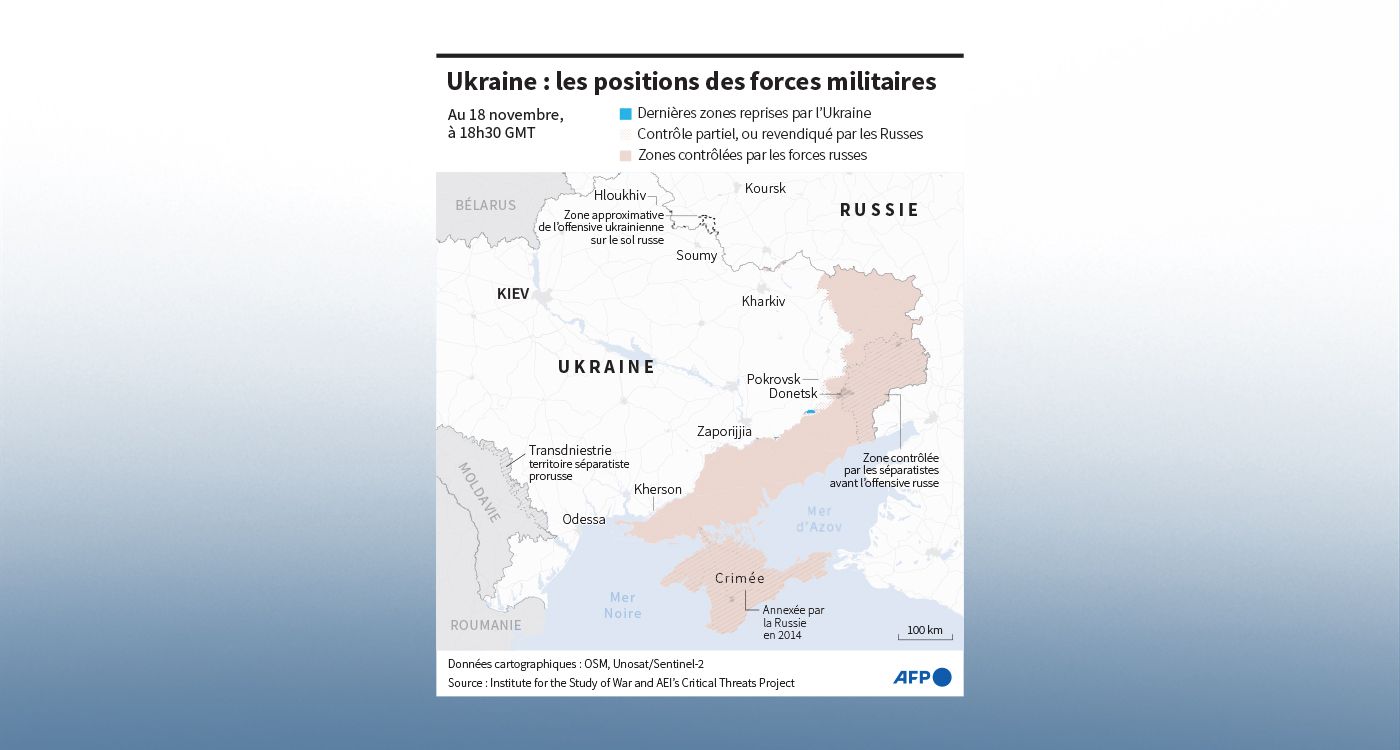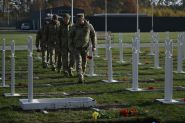- Home
- Middle East
- War in Ukraine: The Nuclear Threat and Escalating International Tensions

Carte des zones contrôlées par les forces ukrainiennes et russes en Ukraine - 19 novembre 2024 ©Valentin RAKOVSKY -Sophie RAMIS - Cléa PECULIER / AFP
The US approval to use long-range missiles on Russian territory has opened a new chapter in the Ukraine war. As Moscow escalates its nuclear threats, the international community is divided between stern condemnations and calls for dialogue. This volatile situation raises concerns about a more dangerous turning point in the conflict.
Washington has crossed a red line for Moscow by permitting Ukraine to use long-range "ATACMS" missiles to target strategic sites on Russian soil. This unprecedented support, along with the controversial delivery of "non-persistent" antipersonnel mines, is aimed at slowing the Russian military’s advance in eastern Ukraine. While Kyiv has praised the decision, it has provoked fierce anger from the Kremlin.
Dmitry Peskov, the Russian government's spokesperson, condemned the US policy as one for "prolonging the war" and warned of appropriate retaliatory actions.
Russian Response: A Nuclear Escalation
In response, Vladimir Putin issued a decree expanding the conditions under which nuclear weapons could be used, now considered an option in the event of "massive" attacks by a non-nuclear state supported by a nuclear power. This doctrinal revision is clearly aimed at Ukraine and its Western allies.
Sergey Naryshkin, head of Russia's foreign intelligence service, stated that this shift renders a conventional defeat "unacceptable" for Moscow. Meanwhile, Russian forces have intensified their strikes on Ukraine, claiming to have neutralized several Ukrainian drones targeting their territory.
International Reactions
United States and European Union: Washington has described Russia's nuclear rhetoric as "irresponsible." Josep Borrell, the EU's High Representative for Foreign Affairs, emphasized that a nuclear war would be "devastating and unthinkable."
France: Emmanuel Macron condemned a "dangerously escalatory" position and called on Beijing to rein in Moscow's ambitions.
China: Beijing responded by calling for "calm" and "restraint." Lin Jian, spokesperson for the Chinese Ministry of Foreign Affairs, stated: "In the current circumstances, all parties should remain calm and exercise restraint, working together through dialogue and consultation to ease tensions."
Although China has not explicitly condemned Russia since the invasion of Ukraine, it continues to call regularly for peace talks and the respect of countries' territorial integrity. These positions reflect Beijing's growing strategic importance in the conflict, with its strengthened ties to Moscow positioning it as a potential mediator for a political resolution.
North Korea: Pyongyang has strengthened its military support for Russia, including arms shipments and the deployment of troops. According to South Korean intelligence, its contingents have suffered heavy losses.
US Warning in Kyiv
In this tense atmosphere, the US Embassy in Kyiv issued a statement urging its citizens to remain on high alert. Warning of an imminent airstrike, it advised preparation for potential evacuations. This warning reflects the escalating intensity of Russian strikes on the Ukrainian capital, a frequent target of aerial offensives.
Zelensky: 2025 as a Strategic Milestone
In an address to the Ukrainian Parliament, President Volodymyr Zelensky called 2025 a crucial year for the nation's future. He urged his fellow citizens to demonstrate collective resilience, emphasizing that this war would determine "the destiny of Ukraine."
As the conflict enters its fourth year, calls for dialogue have fallen on deaf ears. The latest military actions, along with the growing involvement of international actors, highlight a war that is increasingly difficult to control.
The international community is confronted with a dilemma: how far should it go in supporting or containing the parties involved in this devastating conflict, especially as the threats of nuclear escalation and a humanitarian disaster loom even larger?
This uncertainty is further heightened by the return of Donald Trump to power. The former president has already voiced his reluctance to continue providing substantial financial support to Ukraine, raising the possibility of a decrease in US military aid. Moreover, his obscure relationship with Vladimir Putin could shape the US approach to the conflict, introducing an unpredictable dynamic that might disrupt the current balance of power.
Read more




Comments